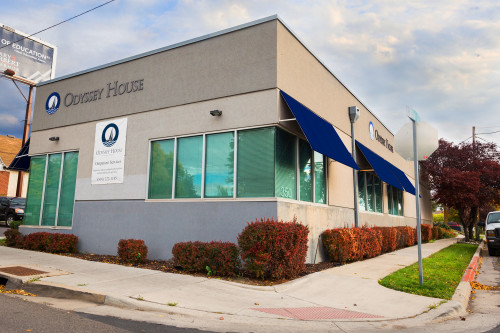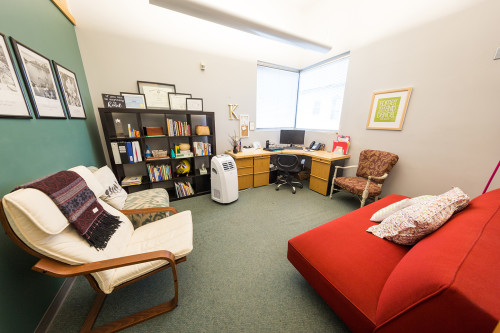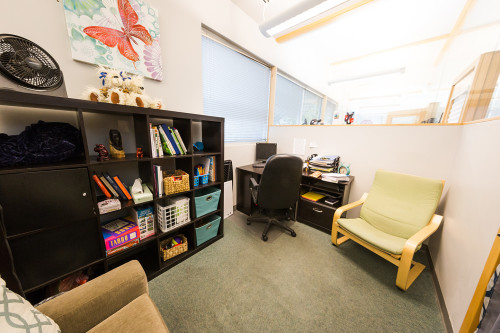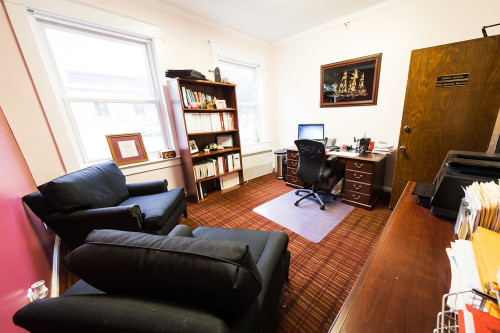






Odyssey House - Adult Outpatient
Treatment Focus
This center treats substance use disorders and co-occurring mental health conditions. Your treatment plan addresses each condition at once with personalized, compassionate care for comprehensive healing.
Primary Level of Care
Outpatient treatment offers flexible therapeutic and medical care without the need to stay overnight in a hospital or inpatient facility. Some centers off intensive outpatient program (IOP), which falls between inpatient care and traditional outpatient service.
Claimed
Recovery.com has connected directly with this treatment provider to validate the information in their profile.
Treatment Focus
This center treats substance use disorders and co-occurring mental health conditions. Your treatment plan addresses each condition at once with personalized, compassionate care for comprehensive healing.
Primary Level of Care
Outpatient treatment offers flexible therapeutic and medical care without the need to stay overnight in a hospital or inpatient facility. Some centers off intensive outpatient program (IOP), which falls between inpatient care and traditional outpatient service.
Provider's Policy
We are in-network with most insurance carriers and we have programs to help offset insurance costs.
Odyssey House - Adult Outpatient
Odyssey House - Adult Outpatient
About Odyssey House - Adult Outpatient
Odyssey House of Utah is a non-profit substance abuse program offering specialized care for a wide demographic of individuals and families, treating addiction and co-occurring mental health since 1971. In addition to their several residential programs in the area, Odyssey House provides outpatient treatment as part of their full continuum of care at 2 locations near the Salt Lake City area.
Their standard and intensive outpatient programs are designed to serve adults who are experiencing dysfunction due to substance misuse, but are able to remain safe while living at home, and maintain sobriety with a lower level of care.
Outpatient for Adults
Adults go through a thorough initial assessment to develop individually tailored treatment plans to fit each individual's unique set of circumstances. Their intensive outpatient program (IOP) meets from 9-16 hours per week, depending on the severity and specific needs of individual clients. Treatment teams consist of certified addiction specialists and counselors, in addition to mental health professionals and psychiatric providers, available to treat clients struggling with co-occurring mental health conditions. On average, clients are in treatment at the Odyssey House for 3-4 months, and upon successful completion, receive ongoing support to maintain long-term sobriety and live stable and independent lives.
A general outpatient program (GOP) provides less intensive treatment for individuals who are beginning to notice they may be struggling with substance use, and have been unsuccessful at quitting or cutting back on their own. The GOP provides structured treatment for individuals from 2–5 hours per week.
Family Involvement
Their programs place a strong focus on accountability, peer support, and family involvement, providing the knowledge and professional support needed for clients to develop healthy communication, coping skills, and other important life skills training. Their individualized approach combines a variety of treatment services, with evidence-based 1-on-1, group, and family therapy, in addition psychoeducational groups and psychosocial rehabilitation. Odyssey House offers regular family support groups, providing education and support services for families and friends who have a loved one struggling with addiction. Their family support groups are open to anyone, even if a family member is not currently enrolled in an Odyssey House treatment program.
Assessments and Classes
Odyssey House provides services for individuals who are required to seek treatment for legal purposes.Their program offers affordable drug and alcohol assessments that meet the requirements of court orders in addition to classes that satisfy legal obligations for clients with DUI charges.
Inclusive Quality Care
Odyssey House of Utah strives to empower individuals to heal and build better lives as the largest comprehensive addiction program in the state. Their dedication to connect every individual to treatment fostered their ability to provide low-cost, quality services. They are a Joint Commission accredited facility that accepts Medicaid and most major insurance providers.
Center Overview
Treatment Focus
This center treats substance use disorders and co-occurring mental health conditions. Your treatment plan addresses each condition at once with personalized, compassionate care for comprehensive healing.
Joint Commission Accredited
The Joint Commission accreditation is a voluntary, objective process that evaluates and accredits healthcare organizations (like treatment centers) based on performance standards designed to improve quality and safety for patients. To be accredited means the treatment center has been found to meet the Commission's standards for quality and safety in patient care.
Insurance Accepted
Cash Pay Rates
Estimated Cash Pay Rate
Center pricing can vary based on program and length of stay. Contact the center for more information. Recovery.com strives for price transparency so you can make an informed decision.
Levels of Care







Your Care Options
Specializations
Co-Occurring Disorders
A person with multiple mental health diagnoses, such as addiction and depression, has co-occurring disorders also called dual diagnosis.
Drug Addiction
Drug addiction is the excessive and repetitive use of substances, despite harmful consequences to a person's life, health, and relationships.
Who We Treat
Men and Women
Men and women attend treatment for addiction in a co-ed setting, going to therapy groups together to share experiences, struggles, and successes.
Approaches
Evidence-Based
A combination of scientifically rooted therapies and treatments make up evidence-based care, defined by their measured and proven results.
Family Involvement
Providers involve family in the treatment of their loved one through family therapy, visits, or both–because addiction is a family disease.
Therapeutic Community
Therapeutic communities allow patients to contribute to the success and progress of their community, through healthy behaviors or even basic chores.
Therapies
1-on-1 Counseling
Patient and therapist meet 1-on-1 to work through difficult emotions and behavioral challenges in a personal, private setting.
Trauma-Specific Therapy
This form of talk therapy addresses any childhood trauma at the root of a patient's current diagnosis.
Rational Emotive Behavior Therapy
A type of cognitive therapy that identifies negative self-defeating thoughts and behaviors, rewriting beliefs to be positive, empowering, and present.
Eye Movement Therapy (EMDR)
Lateral, guided eye movements help reduce the emotional reactions of retelling and reprocessing trauma, allowing intense feelings to dissipate.
Family Therapy
Family therapy addresses group dynamics within a family system, with a focus on improving communication and interrupting unhealthy relationship patterns.
Life Skills
Teaching life skills like cooking, cleaning, clear communication, and even basic math provides a strong foundation for continued recovery.
Motivational Interviewing
Based on the idea that motivation to change comes from within, providers use a conversational framework to discover personalized methods for change.
Relapse Prevention Counseling
Relapse prevention counselors teach patients to recognize the signs of relapse and reduce their risk.
Substances We Treat
Alcohol
Using alcohol as a coping mechanism, or drinking excessively throughout the week, signals an alcohol use disorder.
Benzodiazepines
Benzodiazepines are prescribed to treat anxiety and sleep issues. They are highly habit forming, and their abuse can cause mood changes and poor judgement.
Co-Occurring Disorders
A person with multiple mental health diagnoses, such as addiction and depression, has co-occurring disorders also called dual diagnosis.
Cocaine
Cocaine is a stimulant with euphoric effects. Agitation, muscle ticks, psychosis, and heart issues are common symptoms of cocaine abuse.
Drug Addiction
Drug addiction is the excessive and repetitive use of substances, despite harmful consequences to a person's life, health, and relationships.
Heroin
Heroin is a highly addictive and illegal opioid. It can cause insomnia, collapsed veins, heart issues, and additional mental health issues.
Psychedelics
Hallucinogenic drugs—like LSD—cause euphoria and increased sensory experiences. When abused, they can lead to depression and psychosis.
Methamphetamine
Methamphetamine, or meth, increases energy, agitation, and paranoia. Long-term use can result in severe physical and mental health issues.
Opioids
Opioids produce pain-relief and euphoria, which can lead to addiction. This class of drugs includes prescribed medication and the illegal drug heroin.
Languages
Aftercare
Care Designed for Your Needs
Amenities
Smoking and Vaping Policy
What people are saying
Treatment
5.0
Accommodations
3.5
Food & Nutrition
2.5
Value
3.5
MWP
Treatment in 2025 • (30 days) • Reviewed 04/12/25
Former Client
•Salt Lake City, UT





